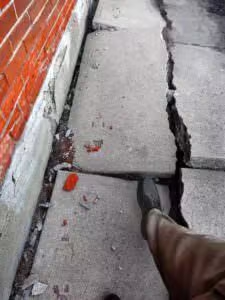While there are some variances by jurisdiction, generally speaking homeowners and business owners have a duty to protect those who enter their land and may be liable for injuries to others sustained on their property. The extent and specific implications of the duty and the liability depends on the nature of the relationship the homeowner or business owner has with the person who entered the property. Visitors are divided into three categories, known as invitees, licensees, and trespassers.
 A property owner owes the highest duty of care to an invitee. An invitee is a person who visits a property which is open to the public, such as a museum or airport (a public invitee), or is invited to enter the premises for a purpose directly or indirectly connected with the owner’s business, such as a shop (a business visitor). Property owners owe the highest degree of care to invitees to make sure they are safe from dangers on their property. Under this standard, a property owner has a duty to reasonably inspect for, discover, and correct unknown hazards in those areas of the premises to which an invitee might have access.
A property owner owes the highest duty of care to an invitee. An invitee is a person who visits a property which is open to the public, such as a museum or airport (a public invitee), or is invited to enter the premises for a purpose directly or indirectly connected with the owner’s business, such as a shop (a business visitor). Property owners owe the highest degree of care to invitees to make sure they are safe from dangers on their property. Under this standard, a property owner has a duty to reasonably inspect for, discover, and correct unknown hazards in those areas of the premises to which an invitee might have access.
A licensee is a person who enters a property, with the landowner’s permission, for the visitor’s own purposes rather than for the landowner’s benefit. A social guest in a home is an example of a licensee. Property owners are likewise required to ensure that conditions are safe for licensees, but the level of care owed to licensees is lower than that owed to invitees. A property owner is only required to take reasonable care to protect licensees from any known hazards on the property, and does not have a duty to inspect for and discover unknown dangers, as he or she does with invitees. Of note, if a business invitee exceeds the scope of their invitation – e.g. entering an area of a store marked for “Employees Only” – their status changes to an invitee and the duty owed by the landlord necessarily lessens.
Property owners may be surprised to know that there is also a duty owed to trespassers on their land, although this duty is lower than that owed to invitees or licensees. A property owner does not need to actively inspect for or repair dangers, as for an invitee, or even take reasonable care to protect them from known hazards, as for a licensee. The only duty a property owner has towards a trespasser is that he or she must not willfully injure the trespasser. There is an exception for children who are trespassing, however. The duty of care that a property owner has towards trespassing children is higher than that owed to trespassing adults. A property owner does have a duty to inspect his or her property to see if there are any potentially dangerous conditions that might attract children and, if there are, act immediately to correct the unsafe condition. This is a public policy consideration in that children are not as capable as adults at assessing risk when it comes to hazards on the property, and may be drawn to such hazards as swimming pools or machinery.
Perhaps of particular interest to potential Gibson & Perkins clients, Delaware – one of the three jurisdictions wherein we practice – has a statute in place that significantly deviates from these general principals. Under the Delaware Guest Premises Statute, 25 Del. C. §1501, licensees and trespassers cannot recover against a landowner for injuries “unless such accident was intentional on the part of the owner or occupier or was caused by the willful or wanton disregard of the rights of others.”
